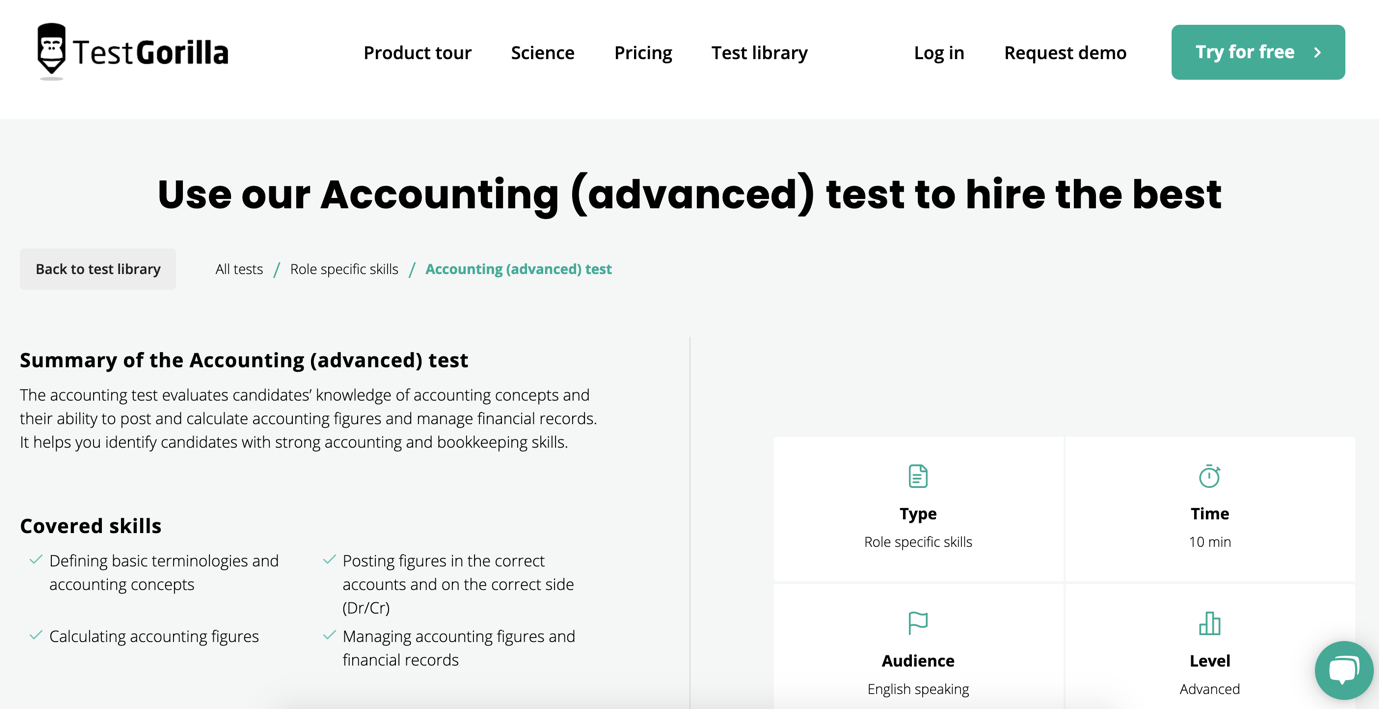Table of contents
If you’re searching for a professional bookkeeper for your organization, hiring the right person for the role is crucial. As your bookkeeper will need to document your business transactions, the candidate you choose will be critical in helping your organization monitor its finances.
If you make the wrong hire, many things can negatively affect your business. Not only can you expect the financial reports to be inaccurate, but by hiring the wrong bookkeeper, some of your business transactions might be incorrectly recorded.
Because financial tracking is a critical part of your business, as is data entry, you will need to hire a bookkeeper who can:
Use bookkeeping software competently
Input and enter data accurately
Understand the essential bookkeeping principles
To this end, this guide will feature the facts on:
The essential skills to look for in your bookkeeper candidates
A job description sample to ensure you attract top bookkeeper candidates
Proven ways to find bookkeepers
Critical pre-employment skills tests to assess your bookkeeper candidates
The recommended interview questions you should use when hiring a bookkeeper
How much bookkeepers typically earn and what you should offer them
Vital bookkeeper skills
There are various essential skills you should be searching for when hiring a bookkeeper. You should be on the hunt for bookkeepers with:
Exceptional organizational skills. With the amount of information your bookkeeper will receive and need to process, they should be able to:
Organize data
Maintain order to achieve deadlines
Plan when working with clients
Attention to detail. Attention to detail is a crucial skill for your bookkeeper. They will be handling data daily, which means they should be able to:
Keep track of financial transactions
Record data with accuracy
Ensure they don’t miss any crucial financial details
The ability to solve problems. Problem-solving is an important skill for various reasons. Your bookkeeper should know how to:
Spot any potential financial inconsistencies
Find out the cause of the financial anomalies
Solve the financial anomalies and inconsistencies
An aptitude to use technology. These days, bookkeeping roles require knowledge of essential software to make the job easier. Your bookkeeper should understand:
Communication tools, such as Slack and Zoom
Bookkeeping software to streamline daily activities
Microsoft Office – and programs such as Excel
Time management aptitudes. Time management is another important skill you should be looking for in your bookkeeper candidates. Your bookkeeper should be able to:
Meet deadlines
Prioritize tasks and handle multiple projects
Maximize productivity by managing time effectively
Good communication skills. A crucial skill for your bookkeeper is good communication. Your bookkeeper will therefore need to be comfortable with:
Communicating with people face-to-face
Communicating in the written form
Communicating electronically – such as via Zoom
Advanced numerical skills. It goes without saying that the bookkeeper you hire should be more than confident when handling numbers. They should:
Be able to carry out financial calculations
Balance the company’s financial books with ease
Use numerical skills to calculate the sum of various business transactions
Advanced accounting skills. As well as numerical skills, accounting skills are also required for your bookkeeper to be successful in the role. Your bookkeeper should be able to:
Understand accounting concepts and terminologies
Calculate accounting figures
Competently manage accounting figures
Bookkeeper job description
Early on in your bookkeeper hiring process, you’re going to need to create a clear and accurate bookkeeper job description. This will help your candidates understand what you are looking for from the successful candidate.
The other reason your bookkeeper’s job description should be clear and accurate is that a lack of accuracy can make your job harder. You might, for instance, attract hundreds of applications that don’t know how to use the specific bookkeeping software that your organization uses. This will increase the time it takes to hire the ideal bookkeeping candidate for your organization.
How to write a great bookkeeper job description
So, what will help you write a great bookkeeper job description is to consider which essential skills they need, how many years of experience they will require, and which technical knowledge they might need. Take these points into consideration:
Will your bookkeeper candidate need to know or be familiar with particular bookkeeping software to be successful in the role? And if they do, which software will they need to know – QuickBooks? Sage? If your bookkeeper is going to need knowledge of one of these tools, you will need to let your candidates know this in your job description.
How much will your bookkeeper need to communicate with the rest of your accounting team? Will they need to communicate frequently, or not so often? Is a certain tool required for team communication that they will need to master – such as Slack or Zoom? Again, if you don’t mention the importance of tools for communication in your organization you are going to attract some candidates who don’t match your requirements, which will increase your time to hire and add to your hiring costs.
How much legal knowledge will be required for your bookkeeping candidates to perform well in the role? Which specific legal requirements are particularly required for the daily financial operations of your organization? If you’re searching for a bookkeeper who has exceptional legal knowledge and can apply this knowledge so that your finances comply with legal requirements, this will need to be mentioned explicitly in your job description.
Does your bookkeeper need any particular qualifications to be accepted for the position? If so, which qualifications will be required? For instance, would you prefer a candidate who has a higher-level qualification or degree in business or accounting? Don’t forget to mention this in your job description.
Now you have a better understanding of the skills and knowledge you’re looking for in your bookkeeper candidates, take a look at our sample bookkeeper job description just below. It’s customizable, so take a look and use it to your advantage.
Bookkeeper job description template
[YOUR COMPANY NAME] is looking for a bookkeeper who will track our financial data and monitor our accounts payable and receivable books.
What is the role of a bookkeeper?
Bookkeepers at [COMPANY NAME] carry out essential financial reconciliation tasks and create reports, and record payments.
The financial reconciliation you are responsible for will help our organization monitor our financial transactions with accurate reports and essential data entry.
Bookkeeper job responsibilities
[COMPANY NAME]’s bookkeepers will ensure that our financial records are kept up to date and take responsibility for our payroll.
Your responsibilities will also include:
Filling out tax forms
Being responsible for data entry
Creating monthly financial reports for [COMPANY NAME]’s transactions
Overseeing accounts payable
Handling accounts receivable
Carrying out bank account reconciliation
Put together financial statements
Handling [COMPANY NAME]’s payments
Carrying out checks on financial data
Monitoring payments and logging adjustments to reflect [COMPANY NAME]’s expenses
Bookkeeper job requirements
Some of the requirements you will need to meet are:
A higher-level degree in accounting
Familiarity with bookkeeping software
Exceptional communication skills
Experience in a similar bookkeeping role
Numerical attention to detail
Legal and tax knowledge
Problem-solving skills
Top organization skills
The ability to interpret data
The ability to stay up to date with bookkeeping best practices
Where to find bookkeepers
Now you have written your job description, your next challenge is to source the right bookkeeper candidates.
What you might already know is that there is a range of places you can source bookkeeper candidates. But you’re going to want to source candidates from the relevant job boards that relate to the type of employment you’re offering. From full-time to freelance bookkeeper job boards, here are a few examples of places you can source bookkeeper candidates.
Sourcing bookkeepers for full-time positions
Accounting.com. As well as entry-level bookkeeping roles and senior-level positions, the job board at accounting.com is a great platform to use if you’re aiming to source bookkeepers for full-time positions. Post your job description on this platform for free and start receiving applications instantly.
The American Accounting Association. This is the ideal platform to use if you are trying to source full-time bookkeepers. With the American Accounting Association, you’ll attract a vast and diverse candidate pool. Posting a job starts at $299, and you’ll find that there is no word limit when it comes to posting.
Sourcing bookkeepers for project/temporary work
Robert Half. The Robert Half platform has a specific option for sourcing remote accounting and bookkeeping staff for your organization. Whether you are looking for long-term or short-term temporary bookkeepers, you will find interim staffing options at Robert Half. Robert Half brings bookkeepers to you. You need to fill out a short form to get more information.
Flexjobs. You’ll be able to post job descriptions for temporary bookkeepers and accounting staff members easily via Flexjobs. As indicated by the name, this job board focuses on flexible roles. Putting 5 job postings up for consideration is possible – and there’s no cost to do so.
Sourcing bookkeepers for freelance positions
Flexjobs. We have included Flexjobs for sourcing freelance bookkeepers because this platform also has a specific section for sourcing freelancers. In fact, as well as part-time or flexible job posts, this job board only accepts freelance contracts. Post your job description to start attracting freelance bookkeepers to your organization.
Freelancer.com. Drawing in professional bookkeepers to your vacancy is straightforward with Freelancer.com. Fill out a form to give details on the bookkeeping project you need completed, provide some details on your business, and explore job profiles of potential freelancers to choose from. Select your ideal bookkeeper and get the project completed.
Pre-employment tests for bookkeepers
Having started attracting good bookkeeper candidates to your vacancy, you might be wondering how you’re going to assess your candidates.
Assessing bookkeeper candidates can be difficult, especially if you have received many applications that all claim to be proficient in QuickBooks. How are you supposed to know which candidates are better suited to your organization than others?
One of the best ways to distinguish between candidates is to use pre-employment skills testing. Using pre-employment skills testing has many advantages.
The best platforms will help you to:
Differentiate between exceptional candidates. When it comes down to deciding between two top bookkeeping candidates, a skills test is the ideal way to do this. It’s also a fair way to make your decision, as both candidates will receive the same test and will be judged on the results of their tests.
Reduce your recruitment costs. When hiring, you might have already found out that there’s such a thing as too many resumes. It can increase your time to hire, which can increase your recruitment costs. With pre-employment skills testing, you can reduce your recruitment costs by instantly narrowing down your applicants. All that’s required is for you to send out the appropriate skills tests and eliminate those who were not able to pass the assessment. This will reduce your time to hire and keep recruitment costs lower.
Hire without bias. Unfortunately, many hiring biases can influence our final decisions – some of which we might not even be aware of. If you want to reduce the biases that can lead you to hire the wrong candidate, who might not be the best fit for the position, skills testing will make sure you hire the ideal bookkeeper candidate who has the best aptitudes for the position.
How to build a skills assessment for bookkeeper candidates
You might be wondering how to choose the particular skills tests for your bookkeeper candidates to assess their skills. It’s important to use a range of tests – not only to assess your candidates’ aptitudes but to assess their cultural fit as well.
Cultural fit is an important factor to consider when hiring any new employee, and hiring a bookkeeper is no different. So, we recommend that you use hard skills tests and soft skills tests to assess your candidates.
Recommended tests for bookkeepers
The tests we recommend reflect the exact skills your bookkeeper candidates should have and make it simpler to assess them. Some of the important skills tests you should use as part of your hiring process include:
Communication tests. We have mentioned that communication is critical for your bookkeeper candidates. Can they communicate efficiently with the rest of the team? A communication skills test will assess how competently and precisely your bookkeeper can communicate in a professional context and interpret non-verbal cues.
Problem-solving tests. Your bookkeeper should have the aptitude to solve problems efficiently and quickly. Find out if they have the problem-solving skills required to identify a problem and then analyze numerical data to resolve any potential problems with a problem-solving test.
Culture add tests. Your company culture is critical to success, and you will want your bookkeeper to have values that align with your organization’s culture. This is where the culture add test can be useful. The test is unique to your organization as you can customize it for your company. Use the test to determine whether your bookkeeper candidates’ interests align with the values of your organization.
Attention to detail. We recommend one type of attention to detail test when hiring a bookkeeper – the textual attention to detail test. Using this test will help you understand whether your candidates can use analytical skills to deal with complex processes. Find out whether your bookkeeper will be successful in the role and avoid any financial miscalculations with the attention to detail test.
Time management tests. Your bookkeeper candidates should be able to prioritize and execute tasks while keeping deadlines in mind. The time management test will let you know whether your candidates can successfully manage their time and meet deadlines with consistency.
Numerical reasoning tests. How skilled are your bookkeeper candidates with numbers? They need to be experts, as you know. The numerical reasoning test will help you gain insight into your candidates’ ability to interpret fractions and percentages. You can also use it to discover how skilled they are at understanding patterns between numbers.
Working with data tests. Entering data will be a critical part of your bookkeeper’s daily task. Are they proficient in data entry? Use the working with data test to determine whether they are expert data entry specialists and can analyze data accurately every day.
Accounts payable tests. Your bookkeeper will also need to manage and oversee your organization’s accounts payable. They should be able to record all transactions and reconcile the accounts. The best way to find out if they can competently carry out this role is with an accounts payable test, which will assess each of these aptitudes.
Accounts receivable tests. How can you find out whether your bookkeeper candidates have the appropriate skills for the job? Not only should your candidates be able to manage accounts payable, but they should also be able to maintain records via accounts receivable as well. The accounts receivable test will give you the information you need on your bookkeeper candidates’ accounts receivable knowledge.
Using custom questions for bookkeeper candidates with TestGorilla
In addition to this range of bookkeeping skills tests, you can ask your candidates to answer more custom questions with TestGorilla. There are various options you can choose from, including, but not limited to:
Essay questions
Video response questions, and
Multiple-choice questions
If you wanted to learn more about your candidates’ knowledge of accounts receivable, you could give them a multiple-choice custom question that features a range of options related to this particular part of the role.
Using qualifying questions for bookkeeping candidates
Qualifying questions are also an option with TestGorilla, which will round out the skills tests you ask your candidates to complete. Qualifying questions do what their name suggests – they determine whether your bookkeeper candidates qualify for your vacancy.
If you wanted to determine whether your candidates have experience with particular bookkeeping software or knowledge of certain communication tools like Slack or Zoom, you could include this in your qualifying question. Your candidates’ answers will determine whether they proceed to the next stage of your hiring process.
It is a fast and simple way to rule out candidates who do not qualify for the position and determine which candidates you would like to continue with.
Bookkeeping interview questions
After the skills tests have been completed, you’ll need to ask the successful candidates to attend an interview. Below, you’ll find some of the important bookkeeping interview questions you’ll want to ask your candidates.
Which accounting software are you familiar with? Which do you prefer?
Can you describe your previous experience as a bookkeeper?
Have you ever worked with a general ledger account?
How would you handle ledger errors? What would your process be?
Have you ever had to adapt to any new accounting software?
How do you stay abreast of best bookkeeping practices?
How do you stay organized as a bookkeeper?
What is meant by the three-way match?
How would you approach a minor bank reconciliation discrepancy?
How confident are you when it comes to communicating with clients and informing them of the nature of their accounts?
Which accounting software are you familiar with? Which do you like best?
Your bookkeeping candidates should know a lot about accounting software or learn more about the software you use in your organization. Listen for evidence that your candidate has the right skills, how they have used the software in the past, and, if not, how they can adapt to new accounting software.
Which industries have you worked in? Can you describe your previous experience as a bookkeeper?
This question gives you the chance to understand your bookkeeper candidates in more detail in the context of their previous roles. If your organization requires bookkeeping knowledge specific to your industry, look for signs that your candidate can (and is willing to) either adapt to your requirements or has prior experience in a similar organization.
Have you ever worked with a general ledger account?
Look out for candidates who can explain in detail what a general ledger account is. They should be able to detail what a balance sheet is and how general ledger accounts might be divided into different accounts.
How would you notice and handle ledger errors? What would your process be?
Listen for detailed answers from your bookkeeper candidates about how they spot errors and whether they use any particular process. This will include how they have noticed the error in the first place, whether they have compared the opening balance with the change for the period and the closing balance, and then move on to how they would fix the error.
Have you ever had to adapt to any new accounting software?
This question is important because not all bookkeeper candidates will know the bookkeeping software you use. A competent, experienced bookkeeper should understand accounting software or show signs that they can adapt to new software. But this doesn’t mean that they can’t learn or are not experienced enough for the position.
How do you stay abreast of best bookkeeping practices?
Your bookkeeper candidates should show signs that they are looking to improve their skills continuously. Does your candidate read to enhance their existing knowledge? How do they keep their finger on the pulse of best bookkeeping practices?
How do you stay organized as a bookkeeper?
Two good answers are using digital approaches, such as accounting software to enter data accurately and keeping your workspace clutter-free. But, look for answers that show your bookkeeper candidates’ ability to use their organizational skills to optimize their workflow and productivity.
What is meant by the three-way match?
Your bookkeeper candidates should know how important it is that your organization pays invoices promptly. Candidates should be able to identify the three crucial documents used to achieve this – the invoice itself, the authorization document, and the confirmation report. They should weave this into their answer and describe their approaches to ensure that invoices are not duplicated.
How would you approach a minor bank reconciliation discrepancy?
Candidates should refer to accounting software and how it would help them fix the bank reconciliation discrepancy. Look for methodical answers that show dedication to catching the error and reconciling it instead of a quick, ineffective fix.
How confident are you when it comes to communicating with our organization and informing us of the nature of our accounts?
Communication tools should feature in the responses to your bookkeeper candidates’ responses to this question – i.e., they should be able to use Zoom, email, and phone communication approaches to inform your organization of the nature of your accounts. They should also be able to explain complex numbers in simple ways so that you can understand them. Listen for any examples that the candidate provides to support their answer.
How much does a bookkeeper cost?
According to accounting.com, the short answer to this question is that bookkeepers earn approximately $40,240 per year – or an hourly rate of $19.35. But the amount you spend on a bookkeeper will vary depending on various factors.
The factors that will determine how much your organization will have to spend on a bookkeeper include:
The complexity of your organization’s transactions
The level of experience your bookkeeper has
Whether your bookkeeper has experience with certain bookkeeping software, and
Where your organization is located
Find and hire a professional bookkeeper with ease
Finding and hiring your next professional bookkeeper can be a challenge, but the key way to simplify this process is to use pre-employment skills tests. How you use them can make a significant difference to your recruitment.
Keep in mind that you will be looking for bookkeeping candidates that best suit your company’s culture. So, in addition to hard skills tests such as the accounts payable assessment, you will need to use other tests to enhance your hiring process and select the best candidate for your organization.
For top skills tests, take a look at TestGorilla’s free trial and find out how pre-employment skills tests can make your hiring process faster and easier.
Related posts
Hire the best candidates with TestGorilla
Create pre-employment assessments in minutes to screen candidates, save time, and hire the best talent.
Latest posts
The best advice in pre-employment testing, in your inbox.
No spam. Unsubscribe at any time.

Hire the best. No bias. No stress.
Our screening tests identify the best candidates and make your hiring decisions faster, easier, and bias-free.
Free resources
This checklist covers key features you should look for when choosing a skills testing platform
This resource will help you develop an onboarding checklist for new hires.
How to assess your candidates' attention to detail.
Learn how to get human resources certified through HRCI or SHRM.
Learn how you can improve the level of talent at your company.
Learn how CapitalT reduced hiring bias with online skills assessments.
Learn how to make the resume process more efficient and more effective.
Improve your hiring strategy with these 7 critical recruitment metrics.
Learn how Sukhi decreased time spent reviewing resumes by 83%!
Hire more efficiently with these hacks that 99% of recruiters aren't using.
Make a business case for diversity and inclusion initiatives with this data.


















